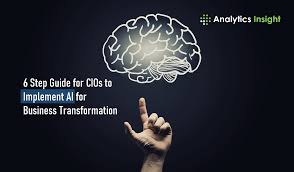Source: analyticsinsight.net
Artificial Intelligence (AI) environment has risen from data scientists to reach the boardroom as a pre-curser to digital transformation. Clayton Christensen, author of The Innovator’s Dilemma, a disruptive technology adds to the premise writing AI “enables new markets to emerge” to disrupts an existing market status-quo.
The adoption path of AI needs a well thought out strategy to evolve in response to the dynamically changing technology parlance. These changes are well equated to the waves in an ocean, where either CIOs need to learn how to ride the wave or be overpowered by its force.
The guide to implementing AI is not a piece of cake, here is a blueprint guide, CIOs may consider implementing Artificial Intelligence in modern enterprises-
- Understanding Artificial Intelligence
- Decoding AI for the Enterprise
- Importance of AI to the Enterprise
- Building AI Use Cases
- Addressing AI Challenges
- AI adoption to the Enterprise
Understanding Artificial Intelligence
Artificial Intelligence defined in business parlance are algorithms that imitate human thinking applying to compute systems using logic, decision trees and if-then rules. AI brings pattern recognition and predictive maintenance from big data to provide intelligently and help businesses make strategic decisions.
Decoding AI for the Enterprise
Reactive AI (Machine Learning AI)
Algorithms used in this early type of AI are reactive and lack memory. This implies that for a specific input, the output will always be the same. Machine learning models which use this type of AI are effective for pattern recognition and simple classification tasks.
Limited Memory Machines (Deep Learning AI)
Limited Memory Machines are built on the concept of how the neurons connect and the human brain works. This type of machine “deep learning” is programmed to handle complex classification tasks and use historical data to make predictions. it also is capable of complex tasks, such as autonomous driving.
Theory of Mind (Reinforcement Learning AI)
Reinforcement Learning AI is capable of understanding human intent and reasoning. Reinforcement Learning AI can forget its previous algorithms and re-learn to deliver personalized results-based business requirements. Reinforcement Learning AI is also referred to as artificial general intelligence (AGI), it can contextualize and generalize information, and extrapolate knowledge to a broad set of problems.
Self-Aware AI (Super Intelligent AI)
Self-Aware AI as the name suggests is not only aware of the mental state around its environment but is also aware of itself. Self-aware AI, or artificial superintelligence (ASI), is artificial intelligence at par with human general intelligence and in future may be capable of far surpassing human cognition by creating a superior intelligent version of itself.
Importance of AI to the Enterprise
Artificial Intelligence is witnessing new heights with each passing day. According to multiple research reports, AI will witness a surge of data generated worldwide to reach a staggering 175 zettabytes, an astounding 430% increase over the 33 zettabytes of data produced by 2018.
AI is primary to co capitalise on this big data. AI and big data play a symbiotic role in 21st-century business success giving companies a competitive edge, improved customer service, improved monitoring, faster product development, reduction in errors and increased adherence to compliance standards.
Building AI Use Cases
AI use cases span industries an early adopter of it being financial services – to the more recent education, marketing, retail and healthcare. Artificial Intelligence models have made their way into every business department, from marketing, finance and HR to IT and business operations incorporating a range of AI applications like-
- Artificial intelligence is transforming how financial services for instance, banks are using AI to automate customer service and streamline back-office processes.
- Collaborative robots, aka cobots function as an extra set of hands working alongside humans in the manufacturing sector on assembly lines and in warehouses; factories to predict maintenance needs, detecting buying habits to predict product demand for production planning.
- The $5 trillion agriculture industry is using Artificial intelligence to reduce workloads, organize production data and yield healthier crops.
- In addition to automating the tedious process of grading exams, Artificial intelligence is harnessed to help students’ access and adapt curricula to their needs.
- IT organizations are using natural language processing to automate user requests for IT services. Applying machine learning to ITSM data, IT service managers are gaining a richer understanding of their infrastructure and processes.
Addressing AI challenges
AI Errors
While Artificial intelligence can eliminate poor training data, human error, problematic data, mistakes in the algorithms can lead to AI errors.
Unethical and unintended practices
Companies need to guard against unethical AI, deep fakes being a primary danger. The racial bias linked to the AI-based risk prediction tools may prove to hold malignant consequences.
AI Adoption in the Enterprise
Recent studies on AI adoption in the Enterprise assert that AI deployments have a promising way ahead. According to research estimates, the average number of AI projects per company will grow to 35, a 250% increase over the average of 10 projects projected for 2020.
Industry best practices for deploying AI, however, are emerging, highlighting advice from practitioners to hold a charge of big AI initiatives. The most critical factor cited by all the data scientists is an urgent need to align closely with the enterprise’ business goals. AI subject matter experts offer essential context and nuance which is hard for deep learning tools to tease apart on its own.


